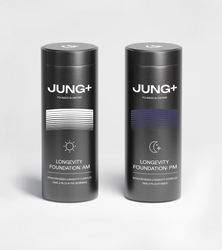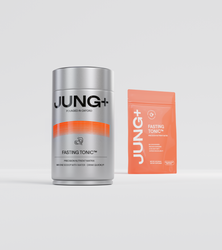As we age, the processes that keep our cells healthy and functioning naturally start to decline. However, emerging longevity research has identified several compounds that may help slow down cellular aging and related processes.
One such compound is calcium alpha-ketoglutarate (Ca-AKG), which has been recognized for its role in cellular health and promoting youthfulness and longevity.
Below, we’ll explore the benefits of Ca-AKG, discuss how it works at the molecular level to promote general health, and explain why this supplement may be a valuable addition to your anti-aging and cellular health regimen.
Understanding Calcium Alpha-Ketoglutarate
Alpha-ketoglutarate (AKG) is an essential molecule involved in several key biochemical processes, particularly in the Krebs cycle (also known as the citric acid cycle or TCA cycle), discovered in 1937. This cycle is essential for producing energy in the form of ATP (adenosine triphosphate) in the mitochondria by oxidizing nutrients, thereby powering nearly all physiological functions.
AKG takes part in many other metabolic processes, too, including:
-
Participating in nitrogen metabolism, aiding in the synthesis of amino acids and proteins.
-
Influencing gene expression via cellular signaling pathways, including mTOR and AMPK, which are crucial for maintaining cellular energy balance.
-
Playing a role in redox regulation and modulating inflammatory responses.
-
Inhibiting protein degradation pathways.
-
Enhancing mitochondrial function and promoting mitophagy in cardiomyocytes.
When alpha-ketoglutarate binds with calcium, it forms calcium alpha-ketoglutarate (Ca-AKG), a more stable and bioavailable form that the body can easily absorb and utilize.
As we age, our natural levels of alpha-ketoglutarate decline significantly, which can impact metabolic efficiency and overall health. Notably, research shows that plasma AKG levels drop nearly tenfold between ages 40 and 80, highlighting its importance for healthy aging (1).
Since AKG isn't found in the human diet, supplementation becomes the most practical way to maintain healthy levels. By supporting the Krebs cycle and mitochondrial function, Ca-AKG provides cells with the energy needed for essential functions and to repair cellular damage, which is fundamental for promoting longevity and health.
The Benefits of Calcium Alpha-Ketoglutarate
Mostly know in the form of arginine alpha-ketoglutarate (AAKG), calcium alpha-ketoglutarate first gained attention within the sports and fitness community for its potential to enhance muscle recovery and performance.
Over time, researchers expanded their focus, exploring its broader applications in anti-aging medicine, particularly its role in cellular repair and longevity pathways. Here's a closer look at Ca-AKG benefits:
-
As a key precursor to glutamine and glutamate, calcium alpha-ketoglutarate promotes protein synthesis while inhibiting protein degradation in muscle tissue, aiding in muscle maintenance and repair (2);
-
In the gut, AKG-derived glutamine serves as a crucial energy source for intestinal cells (enterocytes) and other rapidly dividing cells (3);
-
AKG also supports essential metabolic processes such as ureagenesis, gluconeogenesis, and the synthesis of acute-phase proteins (4);
-
AKG enhances the absorption of Fe²+ (iron), contributing to better nutrient utilization (5);
-
Another critical role of AKG is in collagen metabolism, where it participates in various mechanisms that support connective tissue health (6);
-
AKG exhibits powerful immuno-enhancing properties. It helps maintain a robust gut barrier, boosts immune cell production, enhances neutrophil activity and phagocytosis, and reduces bacterial translocation within the body (7);
-
AKG is a potent antioxidant that helps protect cells from oxidative damage (8);
-
AKG has beneficial effects on skin hydration (9).
How Calcium Alpha-Ketoglutarate Supports Longevity
Ca-AKG influences molecular mechanisms that are critical for longevity and healthy aging. More specifically:
-
Ca-AKG inhibits ATP synthase, a membrane-bound rotary enzyme essential for energy production. It leads to reduced ATP levels, decreased oxygen consumption, and increased autophagy in both C. elegans and mammalian cells (10);
-
Ca-AKG modulates the mTOR pathway, a central regulator of cell growth, protein synthesis, and autophagy. Lower mTOR activity is linked to an extended lifespan in various organisms. While AKG doesn’t directly interact with mTOR, it reduces mTOR activity indirectly through its inhibitory effect on ATP synthase (10);
-
In mouse models, Ca-AKG extends lifespan by reducing systemic inflammatory cytokines and inducing the anti-inflammatory cytokine IL-10, contributing to a more balanced immune response (11);
-
Ca-AKG also activates AMP-activated protein kinase (AMPK), a key energy sensor that regulates cellular metabolism. AMPK activation promotes energy conservation and enhances stress resilience, facilitates autophagy, and improves mitochondrial biogenesis, all of which contribute to longevity (12);
-
Moreover, Ca-AKG indirectly supports the NAD+ pool, which activates sirtuins—proteins critical for DNA repair, inflammation control, and mitochondrial function (13);
-
AKG supports the activity of the Ten-Eleven Translocation (TET) family—a group of AKG-dependent dioxygenase enzymes involved in DNA demethylation. These enzymes regulate DNA methylation and histone modifications, influencing gene expression patterns that are crucial for maintaining cellular function and preventing age-related genetic changes (14).
Calcium Alpha-Ketoglutarate May Slow Biological Age by Up To 8 Years
One study explored the relationship between the epigenetic clock, health status, physical fitness, and the effects of calcium alpha-ketoglutarate supplementation (along with a gender-specific vitamin) on biological aging.(15)
The study involved 42 healthy men and women, each taking one gram of a calcium alpha-ketoglutarate supplement daily. Although participants were advised to take the supplement for 4–6 months, the actual duration of use varied significantly. Their biological age was assessed through epigenetic analysis before starting AKG and then re-evaluated after an average of seven months of supplementation.
Overall, these 42 individuals demonstrated a statistically significant reduction in biological age, averaging approximately 8 years. However, a few participants showed no decrease, which remains statistically acceptable.
Interestingly, two key factors influenced the degree of biological age reduction:
-
A higher baseline biological age relative to chronological age
-
Older chronological age at the start of supplementation
These findings suggest that regular AKG supplementation can slow the aging process relatively quickly, effectively reducing biological age. Moreover, the results suggest that the older a person is, or the bigger the gap between their biological and chronological age, the more pronounced the benefits of AKG supplementation.
Calcium Alpha-Ketoglutarate for Athletes & Performance
Ca-AKG is particularly beneficial for endurance athletes and those engaged in prolonged training. It helps sustain energy levels during intense exercise, reducing fatigue and enhancing endurance. Additionally, Ca-AKG supports muscle recovery by (16):
-
Eliminating excess ammonia, which helps maintain performance and accelerate recovery.
-
Supporting protein production, potentially preserving muscle mass and promoting post-exercise muscle repair.
-
Supporting collagen production, which contributes to joint health and reduces the risk of injury.
-
Enhancing mitochondrial efficiency, helping to lower oxidative stress, inflammation, and muscle soreness.
-
Improving calcium absorption, which is essential for maintaining strong bones and overall skeletal health.
Integrating Calcium Alpha-Ketoglutarate into Your Diet
As we have already mentioned, there are no dietary sources of AKG. Thus, proper inclusion of supplements into your regimen helps you achieve the above-mentioned benefits of maintaining stable AKG levels. Here's a practical guide on how best to incorporate Ca-AKG into your diet:
Recommended Dosages of Ca-AKG
Although the ideal dosage of Ca-AKG can vary depending on individual needs and goals, most studies suggest a dosage between 500 mg and 1,000 mg per day for overall wellness and anti-aging benefits.
Best Time to Take Ca-AKG
The timing of taking Ca-AKG can affect its effectiveness. The ideal time to take Ca-AKG is in the morning or in the first half of the day when it best supports cellular energy production and mitochondrial function. These processes are especially important during the daytime when your body is active and in need of fuel.
Best Forms of Ca-AKG
When choosing a Ca-AKG supplement, there are several forms to consider:
-
Pure Ca-AKG powder
-
Capsule or tablet form
-
Buffered Ca-AKG
-
Time-release formulations
When choosing between different types of Ca-AKG supplements, consider factors like purity, bioavailability, and additional ingredients that might complement its effects. Opting for high-quality, well-researched formulations ensures you reap the full potential of this powerful compound for healthy aging and metabolic support.
Ca-AKG in your diet
Ca-AKG isn't directly available from food, so supplementation is essential.
That said, consuming its precursors can help your body produce it naturally. As a key intermediate in the Krebs cycle, AKG is closely linked to amino acid metabolism, particularly glutamine and glutamate. Including protein-rich foods that supply these amino acids can effectively support your body's natural AKG production.
Here are some key dietary sources:
-
Protein-Rich Foods: chicken, beef, pork, salmon, tuna, eggs, milk, cheese, yogurt
-
Plant-Based Protein Sources: lentils, chickpeas, beans, almonds, walnuts, sunflower seeds, almonds, walnuts, sunflower seeds
-
Fermented Foods: miso, tempeh, kimchi
Potential Side Effects and Considerations
In general, Ca-AKG is considered safe and well-tolerated when taken as prescribed or recommended.
However, like any other supplement, Ca-AKG may not be suitable for everyone, so a medical professional should be consulted, especially for those with comorbidities or who are currently taking medications.
Known side effects of Ca-AKG include mild stomach discomfort, including abdominal bloating, gas, or diarrhea, headaches, fatigue, or dizziness. These are generally rare, mild, and transient. Most people do not experience any significant side effects at all. However, if symptoms persist or worsen, it is recommended that you stop taking it and consult a healthcare professional.
Contraindications and Cautionary Considerations
While Ca-AKG is safe for most people, there are certain groups who should use caution or consult a physician before beginning supplementation:
-
Pregnant or breastfeeding women
-
People with kidney or liver disease
-
People taking certain medications for diabetes, hypertension, or cholesterol-lowering drugs
Who May Benefit Most from Ca-AKG Supplementation?
Ca-AKG may be especially beneficial for people who wish to support cellular health and mitochondrial function as they age. The following people may benefit most from taking Ca-AKG:
-
Older adults: mitochondrial function and energy production decline with age. Ca-AKG can help restore mitochondrial activity and improve overall cellular function, making it a great addition to a longevity-focused health plan.
-
People with age-related conditions, such as loss of muscle mass, joint pain, and cognitive decline, may find that Ca-AKG promotes muscle repair, has anti-inflammatory effects, and improves cognitive function.
-
Athletes and active individuals: Ca-AKG may support muscle recovery, increase endurance, and improve post-exercise recovery by enhancing mitochondrial function and nutrient metabolism.
Besides, Ca-AKG supports overall cellular health, making it a valuable supplement for those focused on maintaining longevity and extending their healthspan.
The Role of Calcium Alpha-Ketoglutarate in the Longevity Foundation Products
Calcium Alpha-Ketoglutarate is a key ingredient in the Jung+ Longevity Foundation's formulations, strategically included to address multiple aspects of the aging process. This potent compound works synergistically with other key ingredients to combat the 12 major causes of aging at the subcellular level, enhancing overall effectiveness.
In the AM formula, Ca-AKG plays a pivotal role in supporting daily anti-aging and defense mechanisms. By participating in muscle protein synthesis and cellular energy production, Ca-AKG enhances mitochondrial efficiency, a crucial factor for maintaining energy levels and muscle mass, essential for active, healthy aging.
When combined with niacin, which boosts NAD+ levels and improves blood flow, Ca-AKG enhances the formula's ability to rejuvenate cells, improve skin health, and protect against oxidative damage. Additionally, pterostilbene and fisetin provide potent antioxidant support, while quercetin helps protect against photoaging.
Longevity Foundation ensures that Ca-AKG is more than just a supplement—it’s an integral part of a holistic strategy to optimize longevity and health. This approach helps to achieve sustained energy, resilience, and cellular health well into their later years.
Ca-AKG Vs. Niacin, NMN, and NR
Ca-AKG, niacin, nicotinamide mononucleotide (NMN) and nicotinamide riboside (NR) play critical roles in cellular metabolism, particularly in the Krebs cycle.
Both niacin, NMN, and NR are precursors to nicotinamide adenine dinucleotide (NAD+), a vital coenzyme involved in energy metabolism, DNA repair, and regulation of cellular stress responses (learn about these compounds here).
While all of them—Ca-AKG, NMN, and NR—support cellular energy production and mitochondrial health, they have distinct roles and benefits.
Ca-AKG acts as a crucial intermediate in the Krebs cycle. It facilitates the conversion of alpha-ketoglutarate to succinyl-CoA, a step essential for maintaining ATP synthesis and cellular metabolism. Beyond energy production, AKG contributes to amino acid metabolism and supports protein synthesis, muscle repair, and cellular resilience by providing critical building blocks for these processes.
In contrast, NAD+ (nicotinamide adenine dinucleotide) plays a different but equally vital role in the Krebs cycle. It functions primarily as a coenzyme, shuttling electrons from glycolysis and the Krebs cycle to the electron transport chain, where ATP is produced. NAD+ is also essential for DNA repair, telomere maintenance, and managing cellular stress responses. Its levels decline with age, impacting cellular energy and longevity pathways.
Can Ca-AKG, Niacin, NMN, and NR Be Taken Simultaneously?
Yes, Ca-AKG, niacin, NMN, and NR can be taken together—as they complement each other and promote overall longevity and cellular health. Since they target different aspects of cellular metabolism and energy production, combining these supplements can provide synergistic effects.
-
Ca-AKG enhances mitochondrial function by supporting the Krebs cycle, improving energy production at the cellular level.
-
Niacin, NMN, and NR increase NAD+ levels, supporting sirtuins and DNA repair mechanisms.
For people looking to maximize the effects of longevity, combining Ca-AKG with niacin, NMN or NR can provide a comprehensive approach that targets both cellular metabolism and DNA maintenance.
Choosing the Right Combination
When choosing a combination of Ca-AKG and niacin/NMN/NR, it's important to consult with a healthcare professional to tailor supplements to your individual health needs. While these supplements are generally safe and complementary, the advice of a professional can help ensure that you are optimizing your longevity regimen and taking the right dosages for your specific goals.
So, while Ca-AKG, niacin, NMN, and NR each individually provide some benefits for aging and cellular health, combining them can enhance their positive effects and offer a more comprehensive solution for promoting longevity and improving life expectancy.
References:
-
Biological effects of 2-oxoglutarate with particular emphasis on the regulation of protein, mineral and lipid absorption/metabolism, muscle performance, kidney function, bone formation and cancerogenesis, all viewed from a healthy ageing perspective state of the art–review article (2008). Journal of Physiology and Pharmacology.
-
α-Ketoglutarate prevents skeletal muscle protein degradation and muscle atrophy through PHD3/ADRB2 pathway (2017). The FASEB Journal.
-
Alpha-ketoglutarate inhibits glutamine degradation and enhances protein synthesis in intestinal porcine epithelial cells (2012). Amino Acids.
-
Glutamine: Does the data support the cause for glutamine supplementation in humans (2006)? Gastroenterology.
-
Alpha-Ketoglutarate (AKG) absorption from pig intestine and plasma pharmacokinetics (2005). Journal of Animal Physiology and Animal Nutrition.
-
Alpha-ketoglutarate stimulates procollagen production in cultured human dermal fibroblasts, and decreases UVB-induced wrinkle formation following topical application on the dorsal skin of hairless mice (2007). Biological and Pharmaceutical Bulletin.
-
Alpha-Ketoglutarate: Physiological Functions and Applications (2016). Biomolecules & Therapeutics.
-
The Antioxidative Function of Alpha-Ketoglutarate and Its Applications (2018). BioMed Research International.
-
The study of skin hydration, anti-wrinkles function improvement of anti-aging cream with alpha-ketoglutarate (2020). Journal of Cosmetic Dermatology.
-
The metabolite α-ketoglutarate extends lifespan by inhibiting ATP synthase and TOR (2014). Nature.
-
Alpha-ketoglutarate, an endogenous metabolite, extends lifespan and compresses morbidity in aging mice (2020). Cell Metabolism.
-
α-ketoglutarate delays age-related fertility decline in mammals (2021). Aging Cell.
-
α-Ketoglutarate improves cardiac insufficiency through NAD+-SIRT1 signaling-mediated mitophagy and ferroptosis in pressure overload-induced mice (2024). Molecular Medicine.
-
Alpha-ketoglutarate affects murine embryo development through metabolic and epigenetic modulations (2019). Reproduction.
-
Rejuvant®, a potential life-extending compound formulation with alpha-ketoglutarate and vitamins, conferred an average 8 year reduction in biological aging, after an average of 7 months of use, in the TruAge DNA methylation test (2021). Aging.
-
Alpha-Ketoglutarate dietary supplementation to improve health in humans (2022). Trends in Endocrinology & Metabolism.





